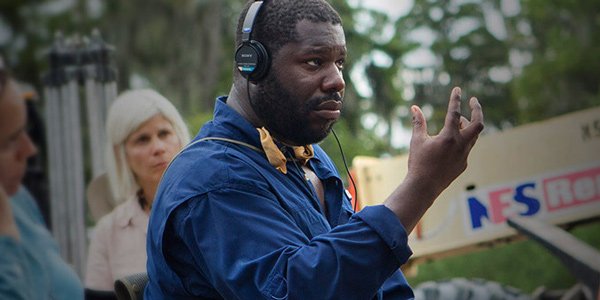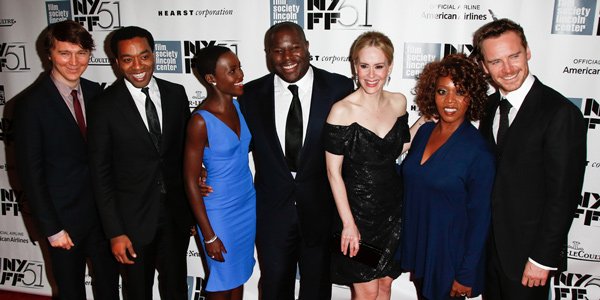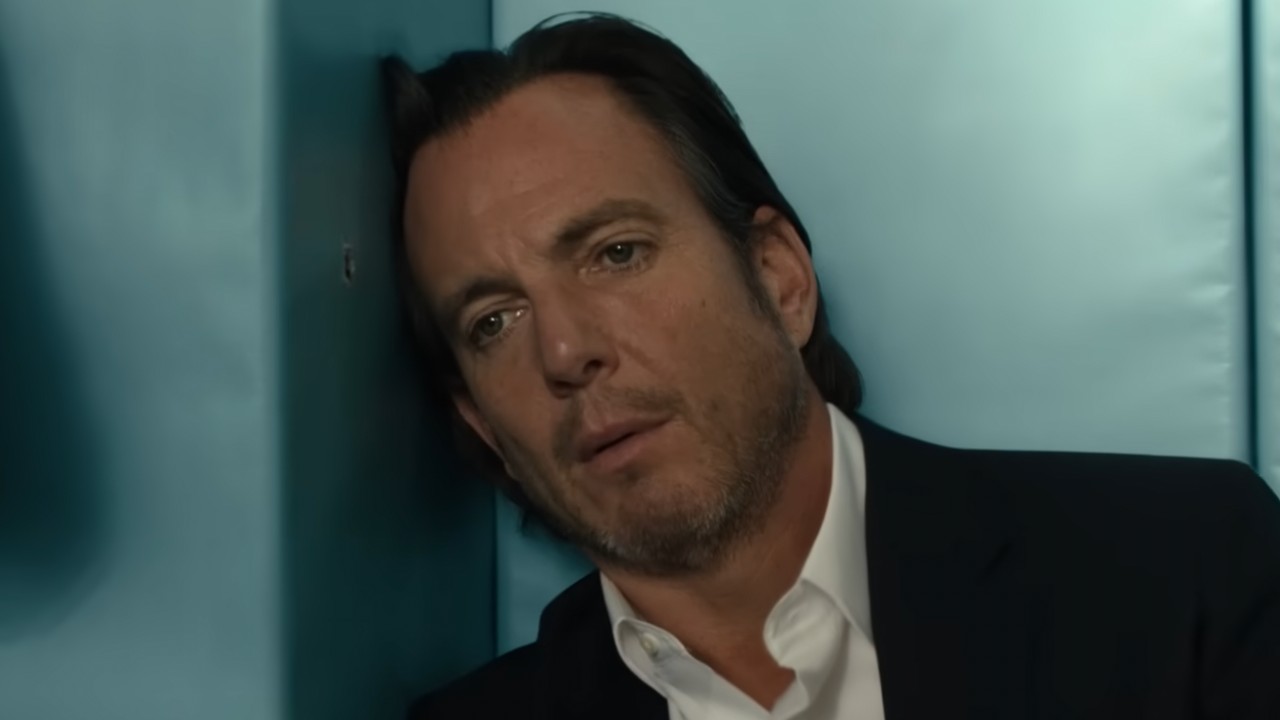12 Years A Slave Director Steve McQueen: Why The Trayvon Martin Case Makes His Film Matter Even More

12 Years A Slave is not an easy movie to talk about in a pithy introduction to an interview. It's not an easy movie to talk about in a rushed 10-minute junket interview either, especially when it's with Steve McQueen, the director who is so unwilling to tolerate fools that a GIF of his reaction at a press conference is minor Internet legend. At one point I asked what I thought was a follow-up question, only to have him tell me he'd already answered it. I was too embarrassed to include it in the transcript.
To be fair, McQueen has earned the right not to surround himself with fools. His transition from the art work to filmmaking has resulted in three masterpieces of varying degrees. his debut film Hunger was a devastating portrait of a real hunger strike, and introduced the world to Michael Fassbender. His follow-up Shame was an even more emotionally raw portrait of sex addiction, with what we've now come to see as an expectedly great Fassbender performance. And now he arrives with 12 Years A Slave, another wrenching true story, this one about a free man living in upstate New York who was captured and sold into slavery in the antebellum South. The film is earning near-universal good reviews and creating the sense that, though he remains uncompromising and continuously thoughtful in his work, McQueen won't just be an art house favorite for long.
I asked McQueen specifically about his use of long takes in some of the film's most brutal scenes, his attachment to what he calls the "recent past" and the film's current resonance-- he surprised me by mentioning Trayvon Martin and the recent repeal of a section of the Voting Rights Act, hot-button topics that many filmmakers would try to avoid entirely. 12 Years A Slave opens in theaters this weekend; much of our interview is best read after you've seen the film, but you can watch the trailer below for a basic rundown of the story.
You've said that this is a universal story. It wasn’t an American story. It wasn’t specifically about this one time, and that people all over the world could understand it. But what I find works about it so well is that it is specific, that it is one man’s story and it’s not the story that we’ve told a lot of times about people being taken from Africa and shipped. It’s not unusual, obviously it happened a lot, but it’s not the kind of story that’s been told.
Well, it was a story that people didn’t know. It was a story I wanted to tell. I think most people don’t realize that there were a lot of black people living in the north who were free. The reason why I wanted to tell that story is because it was an in for me, that you have this guy, who’s with his family, who is an American, who is with his family, and then one day he gets pulled into, kidnapped into slavery. I mean, that was the initial idea I had.
Without knowing that this was a real story?
I don’t know. I didn’t know about 12 Years a Slave yet. Then, I spoke to my wife about it and she said, look, why don’t you look into firsthand accounts of slavery, and we did, and she found this book called 12 Years a Slave, which landed in my hand. My idea was fully formed already and it reads like a script. I couldn’t believe it and I thought, wow, this is the movie that I want to make.
Your Daily Blend of Entertainment News
You've become famous for long takes, or at least that’s what critics talk about from Hunger and from Shame. In this there are two show stoppers that I can remember, the whipping scene and the hanging scene. I’m curious how you chose those specific moments to emphasize with the long take and this really effective, visceral, you-are-there way.
I don’t view it in that way, of long takes to do anything. I mean, I never think of long takes. It’s never in my mind. What I think about is, what’s the best way to portray this scene? What’s the best way of interpreting a situation on cinema? So as far as scenes which are long or short, or conventional or unconventional, I have no interest. I’m just trying to make the best thing I can do at the time. That’s not even in my mind when I’m shooting something.
So, then why was the extended camera for the whipping scene, which is complicated logistically and you’ve got to go through a lot, why was that the best way to do that?
For me, that had to do with keeping a pressure cooker going, keeping the tension of that time in the pressure cooker, and not letting the audience or the scene compress, or off the hook, as you will. It was a situation that was spinning and spinning and spinning and spinning and spinning out of control to the point where we get to the eye of the storm where Epps is whipping Patsey in a clockwise sort of rotation. You’re in the eye of the storm then, to the point of when Patsey drops the soap, you know. You keep that pressure, keep that kind of tension going. If I’d put a cut into that scene, then I would have let the audience off the hook. A cut would have decompressed the situation. To keep the tension going, was vital to that scene. I can’t put a stencil onto a situation, onto a scene, onto a film. The scene or the film have to tell me what it wants, and that’s how I go forth and shoot that scene.
In the hanging scene, there were a couple cuts. A couple are for time, just because the day passes, but even within the moment, the cut doesn't diminish the impact.
Well, for example, the first shot in the scene is Solomon hanging there, after he’s been hung.
The one where people start walking in the background?
Exactly, and what happens is slowly and surely, people start walking out of the house to carry on with their daily chores. They notice him, they recognize him, but they carry on. What that does for me, what I wanted to happen in that frame is to put about two or three layers onto that frame. What you have is a physical illustration, as such, of slavery, and a mental, at the same time.
So it's almost like a metaphor.
It’s not metaphorical at all. It’s visual. You see it, you’re there and the audience goes one plus one and comes up with the answer, whatever it is. You see this happening in front of you, and that’s happening from one shot. You get everything in one shot.
I think the reason why I don’t do any coverage, because when I was growing up, I was using a Super 8 camera, a very expensive Super 8, so therefore, whatever I shot had to be bloody good, otherwise, you know, I’m wasting money. I can’t develop it. It’s too expensive. So, I think that taught me to select, that taught me to edit things in my head or be very specific of what I wanted. I mean, I’m not a person with an AK-47 spraying the whole area. I want to be more like a sniper and be more specific, because, you know, it saves energy and it focuses your concentration.

In those scenes, and several others, you’re obviously letting the audience feel the impact of what these characters are going through, the physical and the mental, but it’s not sadistic. It feels much more exploratory in a way. Do you try to avoid sadism in that, and if so, how are you trying to toe that line?
I didn’t even think of that.
I guess that means you’re not sadistic if you didn’t even think about it.
Well, no. I’m telling a story about humanity. Either you’re making a film about slavery or you’re not. And I wanted to make a film about slavery and of human dignity. It was about Solomon holding on to his dignity through a very brutal regime, that’s it.
Do you ever think about the audience throughout it, like what can they handle?
Yes, very much. Oh, handle? In this case, no. I have to show what I have to show. I mean, if I don’t sort of portray slavery, I can’t pull punches in this situation. The only reason I’m here, because you know, people suffered and died for my freedom, and therefore, I can not pull punches on them. It would be a disservice to them. It would be a disservice to Solomon. The book is far more, you could say, unfortunate than the film, but we have to show it. It’s like having a Holocaust picture without showing brutality. You have to do that. You have to go there.
But you have to show a specific amount. You choose how much of that.
Oh, for sure, because the narrative dictates where you need it and where you don’t. You plot it. You plot it throughout the narrative. I think there are five acts of violence, you can say, within 2 hours and 13 minutes, but they have to show it, because otherwise, if you don’t show it, then you’re not having a film about slavery, and it’s actually not a discussion, you know. It can’t be a discussion.Why were so many people held in bondage for such a long period of time? How did they reinforce it? How did they maintain it? I mean, I couldn’t make a film about a hunger strike without you know, seeing someone who was on the verge of dying from starvation. It wouldn’t be a movie.
For this and both of your previous movies, some people have said, “You need to see this, but it’s kind of hard to watch again.” Is that a valid argument to you?
For me, I wanted to make a movie about slavery. You know, I was very ashamed as a child, I remember my first memories as a little boy, I was very ashamed of slavery. I didn’t know, because I wasn’t taught about slavery. All I knew was that people like me, or who looked like me, were slaves, and I didn’t know anything about it. And now through obviously learning about it and finding out what happened and how it happened, I want to embrace that part, that small part of my history as a necessity.
This is a global history, but also it’s a part of American history and the fact of the matter is that just as people have confronted the Holocaust, people have to confront the recent past of slavery. Now, I don’t know how many Holocaust films have been made in the last 65 years or so, since the second world war has ended. I mean, we’re talking a lot. I’m interested in now, going back to a situation where 150 years ago, there was abolition of slavery. So, for me, it's important, vitally important, particularly because of the recent circumstances which have happened in this country-- the election of a black President, the 150 years anniversary of the abolition of slavery, the 50th anniversary of the March on Washington, the unfortunate Trayvon Martin situation, the rolling back of voting rights. I think there’s never been a better time sort of for people to look at the recent past, in order to go forward. America is a progressive country and what moves me and touches me about this country is this thing in the constitution which says, “and the right to pursue happiness”. How moving is that? So, in order for that to happen, one obviously has to look at their recent past in order to go forward and now has never been a better time to do so.
12 Years A Slave cast image via Debby Wong / Shutterstock.com
Staff Writer at CinemaBlend

